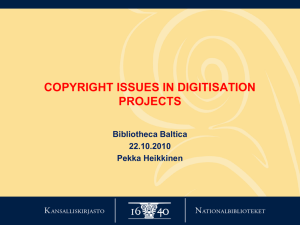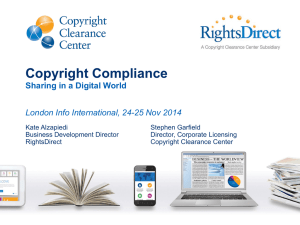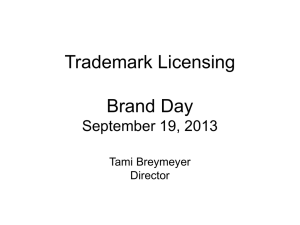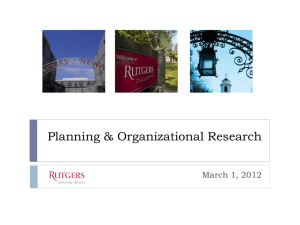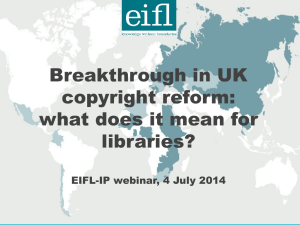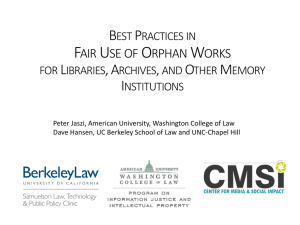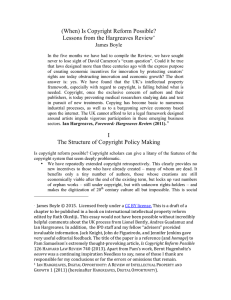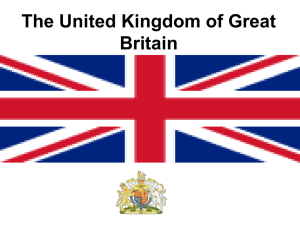Hargreaves* Report and The Digital Copyright Exchange
advertisement
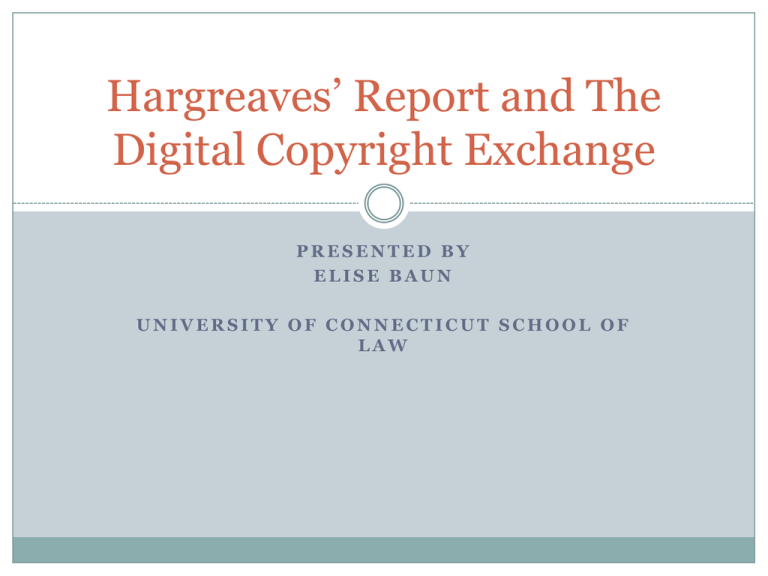
Hargreaves’ Report and The Digital Copyright Exchange PRESENTED BY ELISE BAUN UNIVERSITY OF CONNECTICUT SCHOOL OF LAW Hargreaves Report – Introduction Prime Minister David Cameron Commissioned the Review in 2010. The United Kingdom was worried about falling behind in IP reform. There have been four major reviews in the past six years. Gowers Review – 2006 – 25 of 54 recommendations followed Prime Minister Cameron asked Professor Hargreaves’ of Cardiff University in Wales to conduct the review. Hargreaves Review – Introduction Review was published in May 2011. Sought to answer Prime Minister Cameron’s question of: Could it be true that laws designed more than three centuries ago with the express purpose of creating economic incentives for innovation by protecting creators’ rights are today obstructing innovation and economic growth? Professor Hargreaves’s report answers “yes” and issues ten recommendations. Hargreaves Review – Recommendations Evidence International Priorities Copyright Licensing Orphan Works Limits to Copyright Patent Thickets and Other Obstructions to Innovation The Design Industry Enforcement of IP Rights Small Firm Access to IP Advice Any IP System Responsive to Change Hargreaves Review – Evidence Previous IP policy changes did not look to substantive evidence. Gowers Review also noted the lack of substantive evidence. Professor Hargreaves sent out a call for evidence to evaluate what IP regimes needed change. He determined that the Intellectual Property System is driven by objective evidence. Policy should balance measurable economic objectives against social goals and potential benefits for rights holders against impacts on consumers and other interests. Hargreaves Review – Copyright Licensing The United Kingdom should create a Digital Copyright Exchange. The United Kingdom should support the European Commission in decisions establishing a framework for international copyright licensing. This should benefit the United Kingdom as a major exporter of copyright works. Collecting societies should be required by law to adopt codes of practice. These should be approved by the Intellectual Property Organization and the United Kingdom competition authorities. This will ensure that the codes of practice are consistent with the further development of efficient, open markets. Current Issue - Licensing The process of copyright licensing is not currently fit for the technological age. Expensive Difficult to use Difficult to access Insufficiently transparent Siloed within individual media types Victim of a misalignment of incentives between creators, rights owners, rights managers, and end users Insufficiently international in focus and scope Current Issue - Licensing Because licensing is not fit for the digital age, this creates problems. The market share is smaller than it could be for right owners/managers. The market share going to rights owners is smaller than it could be. New digital businesses within the creative industry are being held back. Innovation is being held back. Infringement of copyrighted content remains persistent. There is a misalignment between creators, rights owners, right manufacturers, rights users and consumers Hargreaves Review – Orphan Works Orphan works are works in which the owner of the copyright cannot be found. There are over 25 million orphan works in private collections in the United Kingdom. The physical state of these works is increasing decayed, because there is no access to copyright licensing. These works include scientific papers. Lack of access to these papers can stunt scientific research. Government should legislate to allow for licensing of Orphan Works – preferably in the Digital Copyright Exchange Hargreaves Review – Copyright Exchange The United Kingdom needs a digital copyright exchange because technology has transformed copyright usage. Infringement is widespread, and most individuals do not understand the United Kingdom copyright laws. Small and Medium Enterprises have a strong barrier to the copyright market due to an inability to negotiate for licensing rights. Digital Copyright Exchange The government should appoint a well-respected individual to oversee the design and implementation of a digital copyright exchange by the end of 2012. This exchange must either be private or semi-private and initiated by the government. Governance should reflect the interests of participants who would work to an agreed code of practice. Digital Copyright Exchange The Digital Copyright Exchange would be a website or a series of websites where licensors could set out the rights they wish to license and allow licensees to purchase those rights. A “one-stop shop” to license copyrights. Licensees would be able to: Look for different types of content across different media Define and agree what use they wish to make of licensed data Be a quoted a price for this use Pay for the rights online Have the content delivered in an appropriate format Report back to licensor on how the content was used Digital Copyright Exchange The Exchange would be funded through a usage charge, but this would not cover start-up costs. The United Kingdom’s government could legislate many incentives to join the Digital Copyright Exchange, but participation could not be mandatory under the Berne Convention. The Exchange would include licensing of orphan works. Issues with Digital Copyright Exchange Who is the highly respected figure in charge of this? How will orphan works be treated under this system? Do standardized offerings create a lack of negotiation? IP operates internationally, must a comprehensive Digital Copyright Exchange must as well? Will this combat infringement at the private level? Issue - Leadership Who should be in charge of creating the exchange? Stock Exchange Google or Amazon Small Start-Up Similar to ICANN What incentive is there for a private company to establish the Exchange if there is no revenue from creating it? Issue – Orphan Works By allowing for a nominal usage fee, this essentially ensures that orphan works are entered into the public domain. Most photographs would not be registered on the Exchange. If the only requirement to establish a work as orphan is to search the digital copyright exchange, this could create numerous problems. Issue – Standardized Formatting You have to buy more than one license for most works. A sound recording has a composition license and a sound recording license. Movies and television require even more licensing. The Review seems to suggest that these licensing transactions will be uniform rather than individualized. Issue - Internationality Copyright licensing is increasingly international. Any Digital Copyright Exchange that operates on a National, rather than International, level will be incomplete. This might be difficult because each country has its own set of rules for copyright licensing. Issue – Infringement One goal of creating the Exchange was to stop widespread copyright infringement. Does the Exchange work to do this? Short answer: It should. The Exchange should lessen the barrier to entry for many companies to reproduce copyright works. This savings should be transmitted to the consumer. If companies are able to obtain a copyright cheaply and easily, they will be more likely to buy a license for the copyright. There must be penalties for those who do not pay on the Exchange and for those who infringe. Conclusion A Digital Copyright Exchange is inevitable. The United Kingdom wants to be the first country to achieve this and gain ground in the field of Intellectual Property. A Digital Copyright Exchange is feasible with current technology. It would be a one-stop shop for Copyright Licensing It should be International Created by a well-respected individual with input from Industry Heads Questions or Comments?

